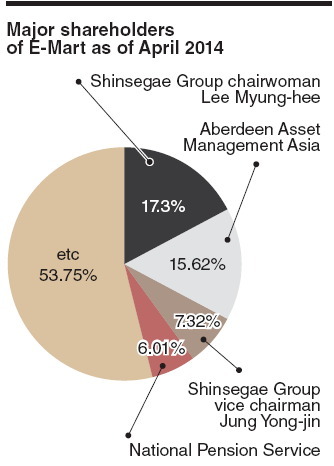With increased shareholdings in the nation’s leading conglomerates, foreign investors now face rising pressure to take an active role as shareholders that could force the companies they invest in to change unethical management practices.
One of the most recent cases involves discount chain E-Mart and one of its largest shareholders, Aberdeen Asset Management Asia.
E-Mart, the country’s largest discount store chain, is owned by retail giant Shinsegae Group.
Singapore-based Aberdeen is the second-largest shareholder of E-Mart with a stake of 15.62 percent as of April this year, following company chairwoman Lee Myung-hee’s 17.3 percent. In total, E-Mart is more than 50 percent owned by foreign investors.

Conglomerates with high foreign shareholdings tend to keep improving their standards for ethical and transparent management. However, Shinsegae Group’s largest affiliate E-Mart currently appears to be doing the opposite.
On May 30, a court handed down a slap-on-the-wrist punishment to the former executives involved in a scheme to dissolve E-Mart labor unions. Former E-Mart CEO Choi Byung-ryul and former human resources director Yoon Myung-gyu were sentenced to 10 months of jail time and two years of probation.
This was after court files showed that E-Mart had put together more than 1,000 pages of documents outlining a strategy for countering the formation of the union before plural unions were allowed in a single workplace in 2011.
According to the documents, people who were considered top candidates to head the other unions were followed and spied on, not to mention intentionally isolated in the workplace.
The former human resources director also paid 81 million won ($78,900) to a man who spied on Jeon Soo-chan and two others who played leading roles in forming unions at E-Mart. Yoon also held a slew of meetings to discuss anti union strategies.
Despite the two executives admitting to their crimes ― both pled for leniency ― the court has chosen to look the other way, and the situation is not so different for the foreign investors.
Despite the fact Aberdeen holds more than double the 7.32 percent stake in E-Mart held by Shinsegae Group vice chairman Chung Yong-jin ― Chung is the eldest son of chairwoman Lee ― the company continues to remain silent on the labor issue.
The Korea Herald also tried to approach Aberdeen several times about the case but has yet to receive a response.
“It is somewhat disappointing to see foreign investors care only about maximizing return on investments. We expected foreign shareholders to be more mindful about how the profit is generated, where the morality is,” said Jeon Soo-chan, labor union leader of E-Mart.
“I would like to ask whether they are willing to make ethical investments in a company that executes ethical management.”
Corporate governance experts here also urged foreign investors to take an active shareholder role.
“Few foreign investors raise their voices to correct mismanagement practices of a Korean company they invest in, partly due to concerns over a negative public reaction (perception) toward foreign capital,” a high-ranking official from the Korea Corporate Governance Service said on condition of anonymity.
“The trend, however, will soon face a turning point, as seen by increased proxy voting by foreign investors at annual shareholders’ meetings of conglomerates in March.”
So far, the National Pension Service, not foreign investors, spearheads shareholder activity in Korea. As a case in point, in March, the pension fund voted against the reappointment of Mando Corp.’s CEO as the second-biggest shareholder in the company, saying he damaged shareholder interests when approving the bailout of an affiliate.
By Bae Ji-sook (
baejisook@heraldcorp.com)






![[Herald Interview] 'Trump will use tariffs as first line of defense for American manufacturing'](http://res.heraldm.com/phpwas/restmb_idxmake.php?idx=644&simg=/content/image/2024/11/26/20241126050017_0.jpg)
![[Exclusive] Hyundai Mobis eyes closer ties with BYD](http://res.heraldm.com/phpwas/restmb_idxmake.php?idx=644&simg=/content/image/2024/11/25/20241125050044_0.jpg)
